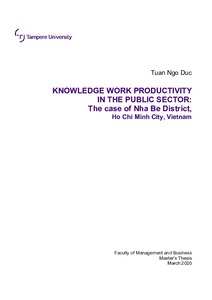Knowledge work productivity in the public sector: The case of Nha Be District, Ho Chi Minh City, Vietnam
Ngo Duc, Tuan (2020)
Ngo Duc, Tuan
2020
Hallintotieteiden maisteriohjelma - Master's Degree Programme in Administrative Studies
Johtamisen ja talouden tiedekunta - Faculty of Management and Business
This publication is copyrighted. You may download, display and print it for Your own personal use. Commercial use is prohibited.
Hyväksymispäivämäärä
2020-04-06
Julkaisun pysyvä osoite on
https://urn.fi/URN:NBN:fi:tuni-202003172715
https://urn.fi/URN:NBN:fi:tuni-202003172715
Tiivistelmä
The performance of knowledge workers influences strongly on the results of knowledge-intensive organizations. Therefore, to increase organizational performance, the role of knowledge work is necessary to be considered carefully. However, the traditional methods are not relevant to gain effectiveness as well as efficiency in current context. The idea New Ways of Working deals with the practice of non-traditional and adaptable work practices and locations for completing knowledge work. Especially, public organizations such as Vietnamese organizations need to consider the relation between new ways of working and knowledge work productivity in order to their performance. Throughout the People’s Committee of Nha Be district, Ho Chi Minh City, the study has been attempted to get three main goals. The study will support to not only understand the mean of knowledge work productivity, but also recognize which factors impact on knowledge work productivity as well as the status of knowledge work productivity in Nha Be district. To obtain these main goals, the study applied the quantitative research method. The study collected data from 162 civil servants working in Nha Be district before testing for reliability and validity by Cronbach’s Alpha and EFA. The research results reveal that the productivity of the civil servants in Nha Be district is affected positively by four factors, comprising physical environment, virtual environment, social environment, and personal work practices. Furthermore, the level of impact of each factor is sorted in ascending: physical environment, social environment, virtual environment, and personal work practices. This is can be a reference for managers in setting up the conditions and the way of working. Moreover, the study also discusses some limitation and suggests a few recommendations for future researches.
